Providing physiotherapy, massage therapy, kinesiology and acupuncture services
to Langley, Willowbrook, North East Gordon, Southwest Gordon Estate, East Clayton, Clayton,
Cloverdale, North Cloverdale and surrounding communities
Did you see the extensive guide on the TMJ or Jaw pain? Here is the link, and give it a quick read: https://www.willowwellnessphysio.ca/help-my-jaw-hurts-or-tmj-dysfunction/

Step 2

Step 1
1. Begin with good posture by tucking your shoulders and your chest up and out.
2. Pull your neck/chin backward, making it seem you have a double chin.
3. Stay in this position for 3-5 seconds before releasing it
4. Repeat 12x/3sets 3x/week
1. Stand beside a door frame or the corner of a wall.
2. Keeping your core engaged, bring your arm up against the wall with the elbow
and the shoulder bent at 90 degrees.
3. With the arm planted on the wall, draw your opposite shoulder back, followed by your torso in a straight line. Keep the back straight and core engaged.
4. Hold for 30-60 seconds.
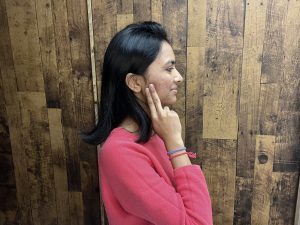 Extra-Oral Massage:
Extra-Oral Massage:1. Take the index and middle finger and place them, and perform using a circular motion technique in the region of either the masseter or the temporalis muscle.
2. Use a gentle massaging motion to facilitate muscle relaxation
3. Continue for 1 minute. 1x/day

2. With the opposite arm, pull the intended side downward and laterally.
3. Laterally flex your neck to the opposite side
Frequency: 2-3x/day
Intensity: Until stretch. Pain free
Duration: 60 seconds
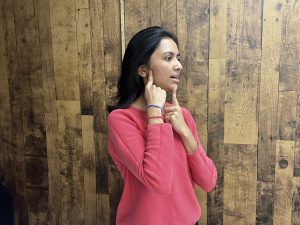 Goldfish Exercise:
Goldfish Exercise: 1. Press your tongue to the roof of your mouth.
2. Now, place one index finger onto the left TMJ and another index finger on your chin.
3. Drop your chin, applying light pressure with each finger and keeping the tongue to the roof of the mouth. Repeat this exercise for the right TMJ.
Frequency: 1x/day every day. Duration: 10 reps/ 3 sets
Frequency: 2x/Day
Intensity: Heat pack should be hot but pain-free.
Duration: 10 minutes
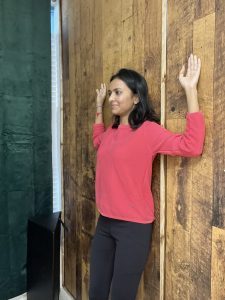
Step 2
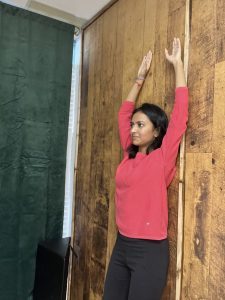
Step 1
1. Start by standing tall with your glutes, shoulder blades, and head touching the wall.
2. Keep your head up and your chin slightly tucked in, and your lower back from arching.
3. Bring your forearms up against the wall with the elbows bent. Then slide them up and down in the comfortable range, making wall angles
Frequency: 2x/day
Duration: 2-5

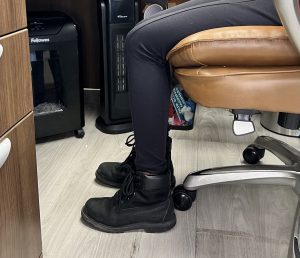
1. Keep your feet flat on the floor or a footrest.
2. Keep a small space between your knees and the seat of the chair.
3. Your knees should be at the same height as your hips or slightly lower.
4. Ankles should be in front of your knees.
5. Relax your shoulders.
6. Don’t slump over your resting elbows on your desk.
7. Knees and forearms should be parallel to the floor.
8. Elbows should be at your sides.
9. Sit up straight and do not slump to one side.
10. Look forward to preventing neck pain or strain
Need to get assessed or still have questions, come and see me. We can chat, learn, and assess the pain further, and provide you with valuable educational resources and help resolve the pain with effective Physiotherapy techniques. Call 604-533-1819 or book today at willowwellnessphysio.ca
Book an Appointment Today With Trent. Call us or Book Online- here
Author: Trenton Stone
Trenton is a graduate from Vancouver Career College (VCC), where he studied massage therapy. His passion for therapy emerged after many years of playing competitive sports and recovery from personal injuries. He is excited to utilize his experience with competitive sports and knowledge of massage therapy to help others. He is particularly interested in treating shoulder cuff injuries, low back pain, TMJ dysfunction, and return to sport. In his personal life, Trenton enjoys competitive boxing, hiking, bouldering, and playing basketball. He also enjoys playing guitar and games with friends.
Medical Disclaimer:
The information presented in this blog post is for educational purposes and should not be interpreted as medical advice. If you are seeking medical advice, treatment, or a diagnosis, consult with a medical professional such as one suggested on this website. Willow Wellness and the author of this page are not liable for the associated risks of using or acting upon the information contained in this article.